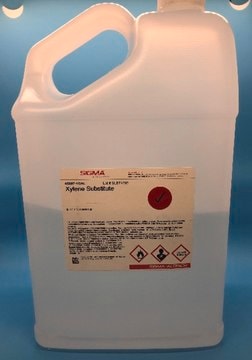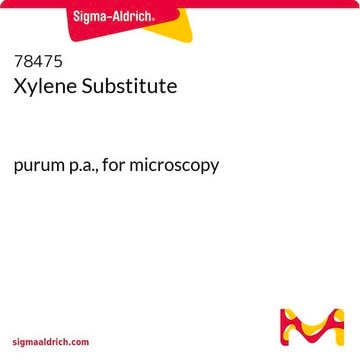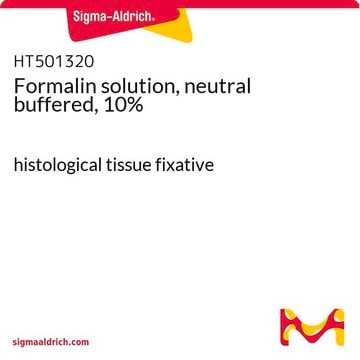H2904
HistoChoice® Tissue Fixative
Autenticatiper visualizzare i prezzi riservati alla tua organizzazione & contrattuali
About This Item
Codice UNSPSC:
12352202
NACRES:
NA.47
Prodotti consigliati
Colore
colorless
Livello qualitativo
applicazioni
hematology
histology
Temperatura di conservazione
room temp
Applicazioni
Designed for the molecular biologist. Specially formulated to preserve antigenic sites for antibody probes and nucleic acid sites for in situ hybridizations. Fixed sections do not require predigestion or other recovery procedures to make important sites available.
Qualità
Contains no formaldehyde, glutaraldehyde or mercury. Non-toxic
Note legali
HistoChoice is a registered trademark of Amresco, Inc.
Avvertenze
Danger
Indicazioni di pericolo
Classi di pericolo
Acute Tox. 4 Inhalation - Eye Irrit. 2 - Flam. Liq. 2 - Muta. 2 - Skin Irrit. 2 - Skin Sens. 1 - STOT SE 3
Organi bersaglio
Respiratory system
Codice della classe di stoccaggio
3 - Flammable liquids
Classe di pericolosità dell'acqua (WGK)
WGK 3
Dispositivi di protezione individuale
Eyeshields, Faceshields, Gloves, type ABEK (EN14387) respirator filter
Choose from one of the most recent versions:
Possiedi già questo prodotto?
I documenti relativi ai prodotti acquistati recentemente sono disponibili nell’Archivio dei documenti.
I clienti hanno visto anche
D G Vince et al.
Analytical cellular pathology : the journal of the European Society for Analytical Cellular Pathology, 15(2), 119-129 (1997-01-01)
Formaldehyde fixatives have traditionally been used to preserve tissues as they impart excellent morphological preservation. Formaldehyde fixes tissue by cross linking, a process which can reduce the antigenicity of tissue and weakens the intensity of immunohistochemical stains. Preliminary studies have
M A Kacena et al.
Biotechnic & histochemistry : official publication of the Biological Stain Commission, 79(5-6), 185-190 (2005-03-15)
We compared histochemical and immunohistochemical staining as well as fluorochrome labeling in murine bone specimens that were fixed with 10% neutral buffered formalin to those fixed with HistoChoice. We showed that sections from undecalcified tibiae fixed for 4 h in
Erik P Rader et al.
Aging cell, 17(5), e12816-e12816 (2018-07-12)
Snell dwarf mice (Pit1dw/dw ) exhibit deficiencies in growth hormone, prolactin, and thyroid stimulating hormone. Besides being an experimental model of hypopituitarism, these mice are long-lived (>40% lifespan extension) and utilized as a model of slowed/delayed aging. Whether this longevity
Michael E Titford et al.
Archives of pathology & laboratory medicine, 129(4), 502-506 (2005-03-30)
In 1987, the Formaldehyde Standard became law in the United States, alerting laboratory workers to the potential carcinogenicity of formaldehyde. As a result, a variety of proprietary fixatives were developed for use in surgical pathology. To assess histomorphology with different
J Melrose et al.
Biotechnic & histochemistry : official publication of the Biological Stain Commission, 83(1), 47-53 (2008-06-24)
Histochoice is a proprietary nontoxic, non-cross-linking fixative designed by the manufacturer to replace formaldehyde based fixation protocols. We compared Histochoice and formalin fixation for several cartilaginous tissues including, articular and growth plate cartilage, meniscus and intervertebral disc. The tissues were
Contenuto correlato
Three-dimensional (3D) printing of biological tissue is rapidly becoming an integral part of tissue engineering.
Il team dei nostri ricercatori vanta grande esperienza in tutte le aree della ricerca quali Life Science, scienza dei materiali, sintesi chimica, cromatografia, discipline analitiche, ecc..
Contatta l'Assistenza Tecnica.















